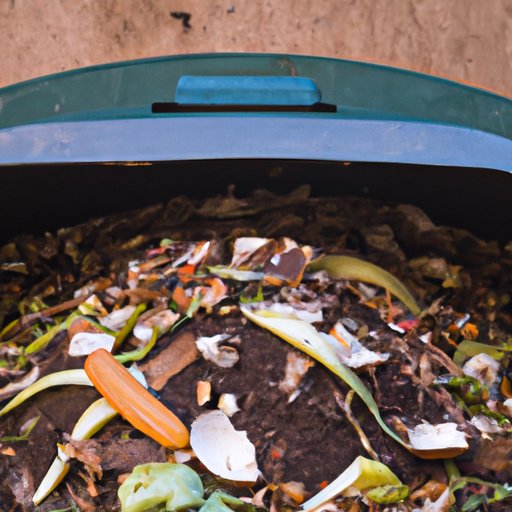Introduction
Making compost from kitchen waste is an easy and eco-friendly way to reduce household waste. Composting helps divert organic materials from landfills, reducing the amount of methane gas that is released into the atmosphere. It also creates nutrient-rich soil that can be used to fertilize gardens and potted plants.
Materials Needed for Composting
To get started, you’ll need a compost bin or tumbler. There are several types of composters available, including plastic bins, wire mesh bins, and rotating tumblers. Choose one that fits your needs and budget. The size of the compost bin will depend on how much kitchen waste you generate each week. You’ll also need a shovel or pitchfork to turn the compost.
Compost bins should be placed in a warm, sunny spot in your yard. If you choose a plastic bin, make sure it has adequate ventilation to allow air to circulate. Wire mesh bins don’t require additional ventilation, but they may need to be covered if the weather turns cold.
Step-by-Step Instructions
Once you have chosen a compost bin and set it up in your yard, you can start adding kitchen waste. Start by adding a layer of “brown” materials, such as leaves, straw, shredded paper, or sawdust. Then add a layer of “green” materials, such as food scraps, coffee grounds, grass clippings, and vegetable peelings. Alternate layers of brown and green materials until the bin is full.
Mix the materials together with a shovel or pitchfork. Add water if needed to keep the compost moist, but not soggy. Turn the compost every few days to aerate it and help speed up the decomposition process. The compost should be ready in about 2-3 months.
What Not to Put in a Compost Bin
It’s important to know what not to put in a compost bin. Avoid adding animal products such as meat, dairy, and eggs, as these can attract pests and create odors. Also avoid adding any type of treated wood, as this can contain chemicals that can contaminate the compost. Finally, avoid adding weeds that have gone to seed, as this can spread unwanted weeds throughout your garden.
Using Finished Compost
Once the compost is ready, it can be used to fertilize gardens and potted plants. Spread a thin layer of compost over the soil and mix it in with a shovel or rake. The compost will help retain moisture and provide essential nutrients to the plants. It can also be used as mulch around trees and shrubs.
Troubleshooting Common Composting Issues
If you’re having trouble getting your compost to break down, try turning it more frequently and adding more green materials. You may also need to adjust the balance of brown and green materials. Too much brown material can slow down the composting process, while too much green material can cause the compost to become slimy and smelly.
Conclusion
Making compost from kitchen waste is an easy and eco-friendly way to reduce household waste. With the right supplies and a bit of patience, you can create nutrient-rich soil that can be used to fertilize gardens and potted plants. Just remember to avoid adding animal products, treated wood, and weeds that have gone to seed to your compost bin.


